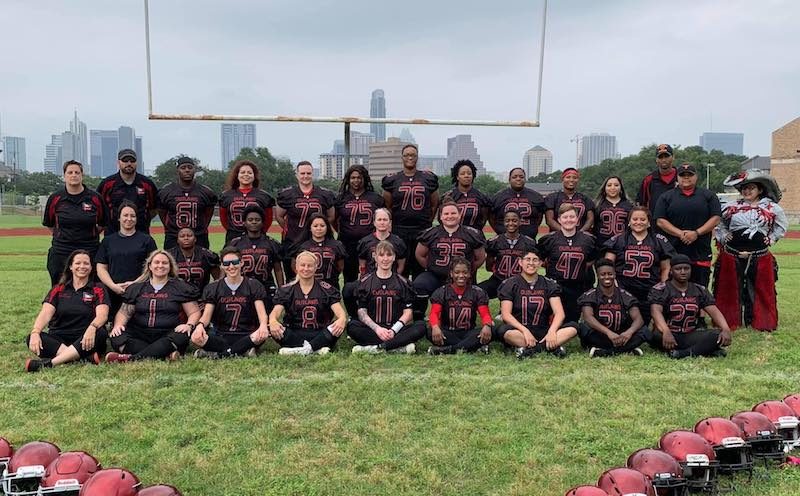Austin Women Find Camaraderie on the Gridiron
By Stephen Cabler
Reporting Texas

Austin Outlaws football team. Photo courtesy of KP Perch.
It begins the same way. The clapping of pads, snapping of chin straps and familiar buzz in the air fills the evening in Austin. Whistles sound, coaches yell warm-up directions and the team takes a lap around the field.
Most fans of football know the sport’s routine. All of that is present here, but one thing is different.
The players are women.
They are talented: Some run the 40-yard dash in 4.5 seconds, throw 50-yard passes and tackle ferociously. They are mothers, coaches, teachers, military members and police officers. They love football and the outlet it provides.
The Outlaws is an all-women’s full-contact football team that has played in Austin for nearly 20 years. They are part of the Women’s Football Alliance, a league started in 2009 that today has more than 60 teams nationwide.
“We’re all excited just to be able to play football and do something that’s bigger than ourselves,” KP Perch, The quarterback of the Austin Outlaws, said during an interview in April. The 26-year-old Perch works as a middle school special education teacher and athletics coach.
The Women’s Football Alliance is divided into three divisions, each based on the number of women on the team. The developmental Division III has teams with fewer than 25 players, while teams with 25 to 45 players compete in Division II. Division I is reserved for teams of 45 or more or teams from Division II deemed to compete at a higher level. The Outlaws play in Division II with teams from Seattle, Tampa Bay and Denver,among others.
The team. part of the American conference, Southwest Division, pitsits players against teams from Dallas, Houston and Central Texas.
The competition is stiff. So far this season the Outlaws have played five games of an eight-game schedule, with one game having been cancelled due to weather.
Women have been playing football for decades but have received scant recognition in a society that has generally viewed the game as a male sport.
“In general, most sports were considered too grueling for women,” said Lindsay Pieper, an associate professor of sport managementat the University of Lynchburg in Virginia. “Yet they competed and excelled, paving a way for future female athletes to participate.”
The Outlaws have met with a warm reception from Austin: Games draw crowds of up to 200 people, head coach Kent Morris said. The Outlaws are part of a larger group of women that want to add to the game.
“Most female athletes support other female athletes in their sporting pursuits,” Pieper said in an email. “I think a lot of women support women entering a realm previously off limits to them.”
The women play for the thrill of the game, because they aren’t getting paid.
The players pay for their equipment, including pads, helmets, mouthpieces and visors. They fundraise to help with costs by selling barbecue and merchandise and holding raffles.
Players say the team is like a family. “Once you’re an Outlaw,you’re always an Outlaw,” Perch said.“We’re always willing to help each other on and off the field.”
Morris — players call him Coach Mo — has been with the team in different roles since 2006. Morris says he’s impressed with the longevity of some players.
“I know there’s a couple of people 50and above playing women’s football,” Morris said. “They played for this team and now they play for another team.”
By comparison, the average retirement age from the National Football League is 30, according to espn.com.
Football is fast and violent, and players said that’s one reason they like playing it. “It becomes an outlet for some women,” Angel Thon, an assistant offensive coach, said. “Some have been through trauma and they come out here and let it all out.”